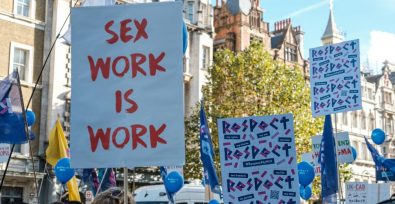At the beginning of September, South Africa’s Western Cape High Court will hear a landmark case that could finally put an end to the criminalization of sex work in the country. The case, decades in the making, carries profound implications for the safety, dignity, and equality of sex workers and has drawn global attention.
Human Rights Watch and Amnesty International have entered the case as amicus curiae—friends of the court—underscoring the international significance of the ruling. Both organizations argue that evidence in South Africa and worldwide is clear:
Criminalizing sex work doesn’t make people safer, and it doesn’t stop human trafficking. What it does is force sex workers into unsafe, hidden environments, where violence and abuse happen with impunity, often at the hands of those meant to protect them.
Breaking the sex work-trafficking conflation
A central argument in the case is the persistent conflation of sex work with trafficking for sexual exploitation. Advocates stress that while both issues deserve attention, they are not the same. Treating them as interchangeable has led to laws and policies that fail to protect either sex workers or trafficking survivors.
A report by Human Rights Watch details research in South Africa that highlights the benefits of decriminalization. Allowing sex workers to operate legally would help trafficking survivors to seek help without fear of arrest, enable sex workers to collaborate for safety, and enhance cooperation with authorities in tackling trafficking. It would also improve access to essential health services—including HIV prevention and treatment—while lowering violence, exploitation, and discrimination.
Opponents of reform argue that criminalization remains a necessary tool against trafficking. However, decades of global evidence suggest otherwise. As Human Rights Watch reports:
Punitive laws drive sex work underground, making trafficking harder to detect and prosecute. Decriminalization, paired with strong anti-trafficking measures, is the proven route to protecting everyone’s rights.
A fight that transcends the globe
The upcoming case is not only about legal technicalities; it is about how South Africa defines human rights and equality. Will sex workers continue to be treated as criminals for consensual work between adults, or will they be recognized as workers entitled to the same protections as any other profession?
The outcome in South Africa could set a powerful precedent for other countries grappling with the same questions—making this case a pivotal moment in the global fight for safety, dignity, and equality. Across the Atlantic, Illinois is taking a similar stride toward evidence-based policy with a new bill that would fully decriminalize sex work. Like the South African case, it recognizes that criminalization does nothing to prevent trafficking but instead deepens vulnerability and risk.
As momentum builds worldwide, you can add your voice by signing the petition urging Illinois lawmakers to pass this critical bill. Together, we can push for laws that protect rights, promote safety, and uphold justice everywhere.







Freedom United is interested in hearing from our community and welcomes relevant, informed comments, advice, and insights that advance the conversation around our campaigns and advocacy. We value inclusivity and respect within our community. To be approved, your comments should be civil.